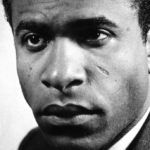Summary: These comments made at a plenary on “The Politics of Identity” at the Historical Materialism Conference in London in November 2018 explores the contentious issue of race, class and identity politics through the lens of some of the recently-published psychiatric writing of Frantz Fanon – Editors
It is often said that the way a problem is framed determines its solution. This is especially the case when it comes to the relation between race and class. I will frame my comments on this problem here in light of the critical problem facing us—the need to develop a viable alternative to capitalism. All positions on identity, race, and class, in my view, have to be measured against how effectively they address this problem.
Clearly, those who seek recognition of their racial or ethnic distinctiveness while ignoring class relations fall far short of posing an alternative to capitalism. But do class-first critics who focus on demanding a “fairer” redistribution of goods and resources do any better? It is hard to avoid noticing that most of today’s leftist critics of the politics of recognition tend to equate an anti-capitalist alternative with a Social Democratic program of income redistribution. While this may be helpful in reviving discussions of socialism, it no more targets the logic of capital than those who ignore class in favor of racial identity. After all, Keynesian redistributive measures are not only compatible with capitalism, but in some instances are necessary for its continuance. We therefore face a conundrum: one side affirms identity at the expense of class, the other affirms class at the expense of identity, but neither makes headway in targeting the logic of capital or in envisioning an alternative to capitalism based on the transcendence of value production.
In light of this, we need theoretical resources that address race and class in such a way as to develop a more thoroughgoing anti-capitalist alternative. One such resource is provided by the ongoing renaissance of interest in Frantz Fanon. Although he is widely known for his emphasis on recognition, Fanon never equated it to asserting racial or ethnic distinctiveness within the parameters of existing society. In fact, the central thesis of Black Skin, White Masks is that it is impossible for people of color to achieve recognition once class relations take on a racialized form. Hegel’s slave seems to achieve recognition from the master, but this does not apply, Fanon argues, in a racist society in which the master does not “see” Blacks as human. Mutual recognition, he insists, “implies restructuring the world.”[i]
I should add that recognition is not truly achieved even in the section of Hegel’s Phenomenology of Spirit dealing with the master/slave dialectic. The slave obtains an initial level of recognition, but Hegel adds that the “mind of his own” achieved in its struggle against the master becomes little more than a “piece of cleverness” if his/her subjective aspirations are not reconciled with the realities of the objective world. Recognition becomes actualized only much later in the Phenomenology, in the discussion of confession in the section “Spirit Certain of itself: Morality.”
None of this may seem directly related to class. Indeed, Fanon is often accused of ignoring class. That is not the case, however, as is further shown by the recent publication of Fanon’s previously unavailable literary, psychiatric, and political writings. In one psychiatric paper, “Conducts of Confession in North Africa,” Fanon explores why victims of colonialism often refuse to confess to crimes that they are clearly guilty of. The reason, he says, is that confession depends on a contractual relation—which is absent in a colonial context. He writes, “I confess as a man and am sincere. I also confess as a citizen and I validate the social contract.”[ii] Confession depends upon prior recognition: “There can be no reintegration if here has been no integration.”[iii] In remaining silent and refusing to confess, it seems that colonized subjects submit to authority; but, in fact, Fanon argues, they are expressing a form of resistance to a racist society that leaves them outside of the social contract.
In contrast, capitalist class relations take the form of appearance of a contract. Workers sell their labor power to capitalists who agree to pay them so long as they augment surplus value. Recognition exists on a juridical level. Wage labor is of course a kind of slavery, since capitalists don’t care about workers as human beings: They extend recognition only to the physiological activity of expending labor power. Victims of racism, however, receive less than even this. Racism precludes mutual recognition and thereby voids the social contract. As a result, confession—including on the level posed by Hegel in the Phenomenology—becomes implausible. But there is a positive in this negative. Since victims of racism have weaker ties to juridical relations, their revolt has the potential to go beyond opposing the inequities of modern society by calling more deeply into question its dehumanized character.
Fanon does not ignore class, as is clear from his discussion of the economic roots of anti-Black racism. But he does not reduce race to class, since they are different forms of domination that produce different subjective responses. Ignoring this gravely hinders the effort to develop a viable alternative to capitalism. After all, workers are never purely workers; they are infused with specificities of ethnicity, race, and gender. Yet those who reject identity politics tout court from a “class first” position tend to view workers in abstraction from factors exogenous to the process of production and reproduction. Ironically, this is exactly how “the worker” appears from the standpoint of capital: as a mere bearer of labor power, the expenditure of undifferentiated labor in the abstract. Viewing people abstracted from the life-world of their lived experience may be adequate from the standpoint of capital, but it is completely inadequate for those trying to free humanity from capital’s dominance.
By paying attention to the specific contours of racial oppression, Fanon’s analysis goes further than those who equate class analysis with a Social Democratic program of income and resource redistribution. As is well known, he argued that those denied recognition by racist norms and institutions inhabit a “zone of negativity” that results in both depersonalization and a quest to surmount it. In another one of his psychiatric writings, he relates this to the way workers are subjected to an alienated time determination. In contrasting the relaxed approach to time on the part of North Africans with the objectified, abstract notion of time prevailing in the West, he writes: “The workers’ relations with the apparatus are strict, timed. For the worker, to be on time means being at peace with the time clock. The moral notion of guilt is introduced here. The time clock prevents and limits the endemic guilt of the worker…the time clock is continually present, it…represents the overall apparatus that employs the worker. Before the time clock, the worker had the possibility to apologize; from now on, the worker is constantly rejected in the solitude with the impossibility of persuading the employer about his good faith.”[iv]
The worker felt guilt, and “apologized”—he confessed—for not keeping pace with the clock. Guilt arises from broken contract—from a debt that remains to be paid. But contracts are between people, not between people and things. Capital employs workers in a contractual relation in order to augment value. But at the same time, it is driven to replace living labor with things at the point of production. Hence, the logic of capital ultimately undermines its contractual form of appearance. There can be no recognition between people and an abstract, impersonal time determination that actually employs them. Overcoming the logic of capital therefore calls for a deeper transformation than just targeting the personifications of capital. Fanon writes, “Labor must be recovered as the humanization of man. Man, when he throws himself into work, fecundates nature, but he fecundates himself also.”[v]
The “humanization of humanity” involves not just abolishing the juridical property right of capitalists; most of all, it entails uprooting social relations in which people are treated as things. This must be the core of any effort to envision an alternative to capitalism. Redistributive economics may be a step to get there, but it certainly isn’t enough. We need a broader strategic horizon that is grounded in the resistance to dehumanization that defines today’s racialized, mysognist capitalism. As Louis Lavelle wrote long ago, “Philosophy and life only have a serious character on the condition that the Absolute is not before me and outside of me as an inescapable goal, but on the contrary is in me and that in that I trace my furrow.”[vi]
[i] Frantz Fanon, Black Skin, White Masks, translated by Richard Philcox (New York: Grove Press, 2008), p. 63.
[ii] “Conducts of Confession in North Africa (I),” Frantz Fanon, Alienation and Freedom (London: Bloomsbury, 2018), p. 415.
[iii] “Conducts of Confession in North Africa (II),” Alienation and Freedom, p. 412.
[iv] “The Meeting Between Society and Psychiatry.” Alienation and Freedom, p. 522.
[v] Ibid., p. 530.
[vi] Louis Lavelle, De l’acte (Paris: Montaigne, 1946), p. 49.






0 Comments